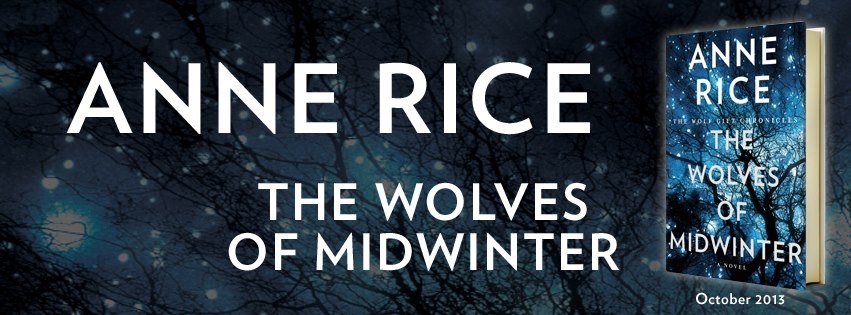 |
This post is available on newly remodeled Wordpress blog, Please read it there! Posts on this blog will only remain here for the next six months.
New Blog's Hyperlink: http://bibliophilesreverie.com/
Discussion Post #1
My head has been swimming with various pensive thoughts, surrounding the thematic importance of Teilhard De Chardin's philosophy in correlation with the overall philosophical and spiritual thrust of Anne Rice's The Wolf Gift. As I wait impatiently and restively for the release of Wolves of Midwinter this fall I tried to do something a bit more productive then wishfully think of an Advanced Reader's Copy of the highly anticipated second installment of The Wolf Gift Chronicles being covertly given away at Book Expo America, which I'll be attending for the fourth time tomorrow. Sadly, I must endure the long slog that awaits before October 15,2013 rolls around. In order to help us all make this unendurable wait much more endurable, I'm planning to pick out certain pivotal sections of the earlier book, and extrapolate on how Anne Rice might develop these mutable plot threads introduced in The Wolf Gift and theoretically developed further in Wolves of Midwinter. Knowing her love for Teilhard De Chardin, there is no better way to start then with discussing how Teilhard de Chardin's various spiritual theories relate implicitly with the underlying meaning of Anne Rice's stories.
In many ways, all Anne Rice's Gothic novels have always dealt with preternatural forces that metaphorically reflect Teilhard De Chardin's highly progressive theories about evolving consciousness. Lestat's own spiritual journey that never goes quite as far as Reuben Golding's novel (in my opinion) ends with a sense of futility in Blood Canticle,in that he never gains complete moral control over his being, all due to the fact that his blood thirst is so intrinsic to a vampire. Invariably,this thirst necessitates murder or immoral action, preventing Lestat from ever gaining the salvation he began lucidly yearning for within Memnoch the Devil.
Deftly, Anne Rice's The Wolf Gift encapsulates these moral quandaries introduced in the Vampire Chronicles, but The Wolf Gift goes much further with trying to supply more coherent answers to these quandaries throughout much of the Vampire Chronicle stories. During Reuben and Jim's confiding conversation at Nideck point in The Wolf Gift, they sit in the Eastern Breakfast room, which has a window that overlooks the dense redwood trees. The descriptions of where Reuben and brother Jim, a priest himself, reside during this conversation may seem pedantic to some, but these recurrent images throughout the story of the primal woods being juxtaposed seamlessly with a house that is literally part of the woods is extremely reflective of the complex state of Reuben's own psyche. Within his psyche, there is the primal essence of himself jostling restlessly with his own human intelligence, which is the psychological fulcrum of this story's psychological conflict. Analogously,this wrestling image that metaphorically depicts Reuben's these two psychological twins image is clearly illustrating the concept of Teilhard de Chardin's evolving conscience.
Interestingly, Reuben even points to his inner psychological turmoil, being representative of a dynamic clash between his more primeval instincts and his more intellectual self; both of which are an extremely important duality within our psyches that separates us from animals. :
"I seek to come to terms with it. I learn new things from it every time it happens, but I am not devolving, Jim."(The Wolf Gift 272)
When Darwin first proposed the theory of evolution, many people within the Victorian era feared the revelation that we were closely related to animals. The most erroneous element of our theories of developing consciousness has been a conscious rejection of our primal instincts; those that are represented in Freudian terms by the "ID." Therefore, we have consciously created elaborate religious rituals, which help us to imaginatively divest ourselves of the influence of our baser selves. Except, Reuben provides a very divergent approach, rather than see these two very basic components of our consciousness, the Jekyll and Mr. Hyde or William Wilson #1 and #2 in Poe terms, being antithetical to each other; he sees them as being closely related and even necessary for a fruitful existence. Reuben's philosophical theory mirrors Teilhard De Chardin's spiritually progressive discussion found in The Future of Man Many of Teilhard de Chardin's theories are very conversant with Darwinian Evolution, and this is why these theories proved to be very subversive to many Catholics, including Reuben's own brother Jim apparently. Much like Teilhard de Chardin, Reuben believes that both his primeval senses and his more human consciousness are not things to be viewed as mutually exclusive, but parts of our psyche that are indeed mutually inclusive.
Even though Jim recapitulates the various antiquated notions of moral development and the inherently depraved nature of werewolves, Reuben optimistically finds that the clear fact that his human consciousness remains alive during his transformation into a werewolf signifies the fact that the marriage between his more primeval instincts and intellectual thoughts is very possible. In many ways, Teilhard de Chardin's depiction of our evolving consciousness is extremely Augustinian, in that this theory posits that our overall moral trajectory that is implicit in nearly all our actions is towards the good, even if this moral trajectory can become skewed by our impartial acknowledgement of the full spectrum of our psychological selves. This would explain why Dr. Jekyll is still wholly responsible for the actions of Mr. Hyde because Dr. Jekyll represses these instincts, and never takes full moral responsibility for his actions. Unlike Dr. Jekyll, Reuben struggles throughout the novel trying to make peace with his Mr. Hyde essence and tries to seek ,through valiant free will, a way to wed these two inextricably opposed twins of his psyche.
At the very end of the chapter, it is also very important to note that the entire confession, involving his brother Jim, takes place within Reuben's inner sanctum (Nideck Point) rather than the church that is so far-removed from the context of the Redwood forest that imbibes Reuben with a deep sense of his paradoxical self.
Within the next post, I would love to further this discussion of Reuben's spiritual odyssey, by theorizing how the greatest spiritual conundrum of this novel might be resolved within Wolves of Midwinter:
"Do you think Teilhard de Chardin could have been right? That we fear God does not exist because we can't spatially grasp the immensity of the universe; we fear that personality is lost in it when maybe it is a super-personality that holds it all together, a super-conscious God, who planted evolving consciousness in each of us." (The Wolf Gift 274)
Unfortunately, this post only examined the insights that Reuben makes about his own self, in that we must live peaceably with awareness of the duality that exists within our psyches. If our internal psychological personalities are this complex and difficult to fathom, how are we to fathom the potential that a larger force might exist within the universe, like the notion of a God? This is the question that still frazzles Reuben, even by the end of novel. Using another scene in particular, I will continue my next post, in one week or later, with a discussion of the meaning of "midwinter" in different myths that preceded the publication of this novel, and how this may symbolically provide us with some clues as to how this aforementioned unsolved spiritual question might be explored further in Wolves of Midwinter.
For now, I have Book Expo America to look forward to!







.jpg)












